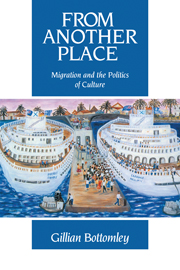Book contents
- Frontmatter
- Contents
- Preface and acknowledgements
- Part I Migration studies and the problem of culture
- Part II Practising cultures
- Chapter 4 The politics and poetics of ethnicity
- Chapter 5 Dance, music and relations of power
- Chapter 6 Re-negotiating ‘tradition’: the case of dowry
- Part III Constructing identities: gender, class, and ethnos
- Bibliography
- Index
Chapter 6 - Re-negotiating ‘tradition’: the case of dowry
Published online by Cambridge University Press: 05 November 2011
- Frontmatter
- Contents
- Preface and acknowledgements
- Part I Migration studies and the problem of culture
- Part II Practising cultures
- Chapter 4 The politics and poetics of ethnicity
- Chapter 5 Dance, music and relations of power
- Chapter 6 Re-negotiating ‘tradition’: the case of dowry
- Part III Constructing identities: gender, class, and ethnos
- Bibliography
- Index
Summary
Matrimonial strategies cannot be dissociated from the set of strategies – I am thinking for instance of strategies of fertility, of educative strategies as … cultural investment or of economic strategies such as investing or saving money, etc. – through which the family aims to reproduce itself biologically and, above all, socially …
Bourdieu, 1990, p.68We have seen that cultural practices are inseparable from the political and economic processes that form, limit and transform them. Nevertheless, the most intricate cultural model can have the quality of a relatively fixed and enduring list of ingredients. The work of the Schneiders in Sicily and of Herzfeld in Greece has suggested that the concept of tradition, implied in such models, requires careful analysis. As Herzfeld demonstrated (see chapter 2 above), there can be ambiguities in supposedly fixed referents, and people re-work ‘traditions’ in relation to changed circumstances. In the politics of culture, ‘customs’ can become strategies in the struggle for symbolic and material resources. In this process, particular forms of religious practice, kinship – even language, music and dance – can become boundary markers. A list of ‘cultural traits’ conveys none of these social dynamics, yet such lists abound in migration studies, reinforcing a static notion of culture as a series of distinct attributes defining ethnicity. The interplay between economic, social and political factors on the one hand and cultural practices on the other can only be grasped by attention to the interplay itself.
- Type
- Chapter
- Information
- From Another PlaceMigration and the Politics of Culture, pp. 89 - 102Publisher: Cambridge University PressPrint publication year: 1992



